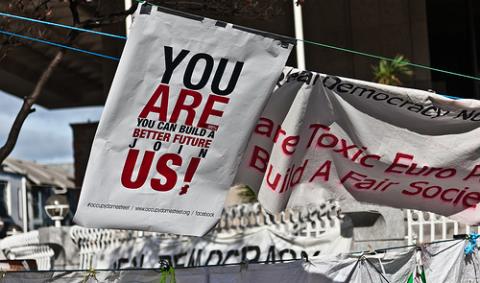Why is Occupy so vacant?

Through its organisational 'anti-structure' and insistence on 'questioning everything' the Occupy movement brought about its own demise. By Tom Boland.
Occupy camps across the world have disappeared – there were once perhaps two thousand, and now there are a few hundred. In Ireland, the Dame St. camp was forcibly demolished, Cork is packing up gracefully, Waterford was practically empty and Galway will soon follow. Certainly, one of the reasons for the decline is that public bodies eventually object to the camps and police forces remove them. Yet, this isn’t simply the suppression of protesters despite popular sentiment. These camps are easy to remove because they have long passed the zenith of their popular appeal.
From the first I supported the occupiers, spent a night on Dame St., engaged in talks, protests, publicity stunts and generally helped out. Consistently I tried to focus the protest on the bank bailouts and austerity. Certainly, the Occupy movements did manage to raise public awareness on these and other serious issues. Over time, the Occupy movement has been disappointing and frustrating, especially since so many resources and so much commitment was wasted.
Unfortunately, despite the great qualities of many of the individuals involved in Occupy and supporting it from afar, there are inescapable flaws in the idea. For this reason, the Occupy movement is peculiarly vacant; it even resembles a vacuum or a black hole – nothing comes out.
Firstly, the Occupy movement worldwide is based on the principle of direct democracy, and every camp has a general assembly at least once a day, with a facilitator to ensure that everybody gets a chance to speak. There are even special hand gestures developed to indicate approval or disagreement.
This principle of direct democracy is largely inspired by anarchism, which distrusts authority, structure and institutions – leading to rather lengthy, exhaustive and inconclusive assemblies. Anarchist anthropologist David Graeber even suggests that a community without these things, like Occupy, is the natural state of humanity. I don’t think this accurately reflects any well-documented historical or anthropological case. Rather, it closely resembles the temporary state of statuslessness found in initiation rituals or a liminal carnival. Worse again, this unwieldy tool of direct democracy demands complete unanimity to allow the camp to pursue any strategy or action; which means that even one recalcitrant or saboteur can stymie everything.
This organisational structure – or ‘anti-structure’ – means that very little can be agreed upon; for instance, a real step-up in terms of civil disobedience was the occupation of a NAMA building on Oliver Plunkett St. in Cork. The occupiers were all once participants in Occupy Cork, but because the entire general assembly could not agree on the action, it was not an ‘Occupy’ occupation. Confused? So am I. What ‘occupy’ could have done well is mobilise active protestors – giving each of them an extended network to call on for protests; in reality it was more immobilising.
Alongside the principles of direct democracy, the Occupy movement claims to speak for the 99%, an economic statistic from Joseph Stiglitz which reflects the disparity of incomes between the top 1% and the rest. While this is correct in America, the economic situation is much more complex. Furthermore, there is a tendency to conflate economic fact with political reality; as though 99% of the population had pledged their support to Occupy. Claiming to speak on behalf of ‘the people’ is as old as the French Revolution, but the Occupy slogan “We are you, you are us” is extraordinarily naive.
Curiously, the Occupy movement sometimes exhibits a profound disdain for the general public. The reference to the general public as ‘Sheeple’ (sheep-people) is particularly self-defeating for a populist movement.
Many Occupy statements – and especially on Facebook – concentrate on unmasking and debunking media propaganda and political spin. This critical reflex is scarcely unique to Occupy, and increasingly pervades modern political debate, but in Occupy it is ubiquitous, banal and limitless. There is almost nothing which one occupier or another cannot reveal as an ideology or even a conspiracy.
This penchant for unmasking critique tends to lead the occupiers into believing their own hyperbole. For instance, “debt is slavery” is a popular slogan – but taken not as a rhetorical formation but a genuine statement of fact. I will leave it up to readers with mortgages to decide how closely their lives resemble that of slaves in ante-bellum America or Imperial Rome or modern trafficked labour.
Another critical slogan is “Wake up!”, as though the general public were merely sleepwalking. This is an attractive thought: you are right, others are unenlightened, but eventually may change. However, what this amounts to is a closed system: the occupier is always right; there are no facts or propositions which cannot be trumped by the notions of brainwashing, media-blackouts and critical question begging. This over-reach also informs the frequent insistence on total revolutionary change of the whole system, rather than achievable goals.
This is why the Occupy camps are vacant. Their centre is an empty space, which doesn’t prefigure the potential utopian future as defenders of the concept argue, but instead undermines any form of organisation and by “questioning everything” prevents most political actions.
(P.S. I’d love to be proved wrong –not by being unmasked as an ideological stooge but by the appearance of a growing movement engaged in mobilising public awareness on specific issues. In particular, there is an enormous opportunity for representative democracy in the referendum on the Fiscal Compact. If every occupier, sympathiser and protestor put their energies into a No vote, they might really change society.)
Tom Boland Lectures in Sociology in Waterford Institute of Technology.
Image top: infomatique.
